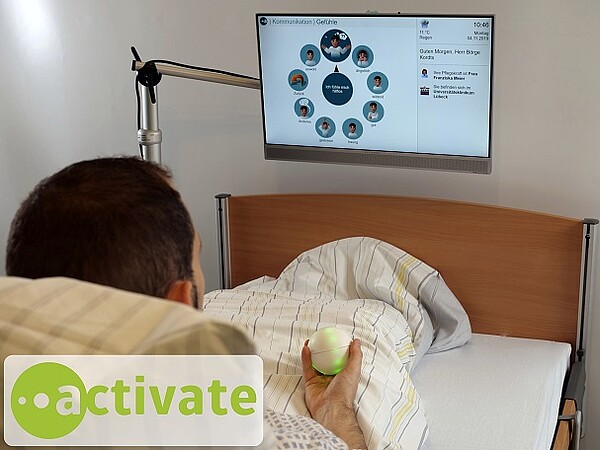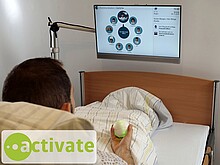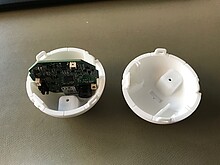ACTIVATE
Facilitating communication and orientation for ventilated intensive care patients
Ventilated and non-speaking patients require help in communicating with caregivers, treatment providers and relatives. The ACTIVATE system is designed to assist in this situation and is controlled by a ball-shaped, easy-to-use input device called BIRDY. Using the input device, patients can communicate specific needs to therapeutic staff during the awakening process.
MOTIVATION
A stay in the intensive care unit is associated with many physical and emotional stresses. This is especially true for ventilated patients, as they are hardly able to communicate their physical and psychological needs, such as pain, thirst or fears. At the same time, research results show that successful communication with the nursing and treatment team, especially during weaning from the ventilator, is important for quickly regaining orientation and avoiding complications.
Until now, hardly any aids for communication with ventilated persons have been available in intensive care units. The ACTIVATE project contributes to closing this innovation gap by developing a socio-technical system to support these communication processes.
SYSTEM
In the ACTIVATE project, a technical solution was designed and developed to facilitate the communication of people in need of care with caregivers. The innovative interaction device BIRDY is specifically designed for the context of use and control in the intensive care bed. The patient uses BIRDY for control and can select applications on the monitor via menu navigation.
Frequently registered stresses such as fear, feelings of strangeness, loss of identity or inadequately treated pain in the wake-up phase can be avoided by the new interaction possibility of the restricted patient. The self-determination and quality of life of those affected is increased.
The project was funded by the BMBF from 2017-2020. The consortium consisted of the University of Lübeck (IMIS, ITM, ISE), UKSH Lübeck, the company Cognimed GmbH in Reinfeld, and the company Rehavista GmbH in Bremen under the umbrella of the Center for Population Medicine (ZBV).
For more information see project page.

Currently, the project is being further developed in COPICOH within the framework of dissertations. In order for the ACTIVATE system to be recommended for safe use in practice, further testing under everyday conditions in intensive care units is initially required.
In the medium and long term, ACTIVATE can be supplemented by further applications, such as therapy games in the field of logo-, ergo- or physiotherapy or entertainment applications such as video telephony, music and film streaming. The integration of a simultaneous translation function is also conceivable. In addition, the extent to which the ACTIVATE system can be transferred to other target groups, such as ventilated patients in home care or nursing facilities, should be examined.
Project Members
Katrin Balzer, Prof. Dr.

Institut für Sozialmedizin und Epidemiologie (ISE)
+49 451 500 51262
katrin.balzer(at)uksh.de
Adrienne Henkel, M. Sc.

Institut für Sozialmedizin und Epidemiologie (ISE), Sektion für Forschung und Lehre in der Pflege
+49 451 500 51267
adrienne.henkel(at)uksh.de
Jan Kopetz

Institut für Multimediale und Interaktive Systeme (IMIS)
+49 451 3101 5130
kopetz(at)imis.uni-luebeck.de
Börge Kordts, M. Sc.

Institut für Telematik (ITM)
+49 451 3101 6422
kordts(at)itm.uni-luebeck.de
Susanne Krotsetis, M. Sc.

Pflegeforschung am UKSH Campus Lübeck
+49 451 500 13613
susanne.krotsetis(at)uksh.de
Angelika Schley, M.A.

Institut für Sozialmedizin und Epidemiologie (ISE)
+49 451 500 51271
angelika.schley(at)uksh.de
Andreas Schrader, Prof. Dr.-Ing.

Institut für Telematik (ITM)
+49 451 3101 6420
schrader(at)itm.uni-luebeck.de
Swantje Seismann-Petersen

Institut für Sozialmedizin und Epidemiologie (ISE)
+49 451 500 51271
swantje.seismann-petersen(at)uksh.de




![[Translate to english:] Link COPICOH [Translate to english:] Link COPICOH](/fileadmin/_processed_/9/1/csm_LI-In-Bug_8ed46db0dc.png)
![[Translate to english:] Link COPICOH [Translate to english:] Link COPICOH](/fileadmin/_processed_/1/b/csm_vimeo_icon_white_on_blue_rounded_b79e632cf7.png)